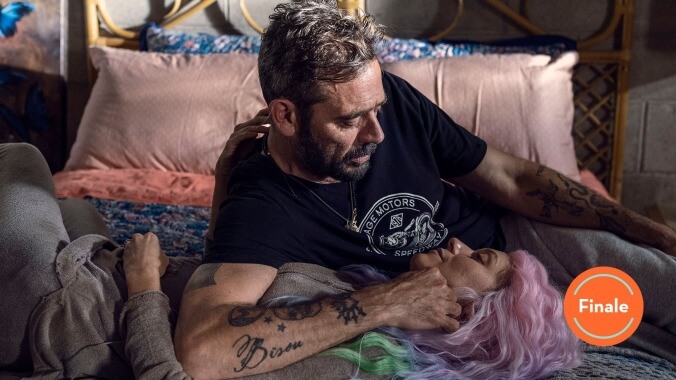It’s been almost exactly five years to the day that Jeffrey Dean Morgan made his first appearance as Negan on The Walking Dead. For all the criticism that those early episodes with Negan and the Saviors subsequently received, there was always something compelling about Morgan’s portrayal of the character. Even with all the cringeworthy “pants-shitting” talk they regularly saddled him with, the actor managed to take the malevolent villain and imbue him with charisma, charm, and menace in equal measure, making it all too easy to understand why he was the kind of person others would follow without question. He wasn’t relatable, but he made sense; the heightened camp elements of Morgan’s performance were part and parcel of the character, a way to cleverly depict the fact that everything Negan did back then was, in some sense, a performance. He knew he was putting on a show, and what helped make it magnetic was the fact that the viewer was never quite sure who Negan was under all that slippery bravado.
And now, half a decade later, we’re finally unpacking the backstory to one of the few characters who is continuing to keep The Walking Dead interesting in its final seasons. “Here’s Negan” makes sense as the final installment of these bonus season 10 episodes, not only because it’s the best of the bunch, but because it effectively bookends the first, Maggie-centric episode, bringing their histories full circle. Maggie returned to her old life because it’s maybe the only place left that feels like home for her. And when she arrives, the man who murdered her husband is standing right there, free and clear. Negan returns to Alexandria at the end of this hour not because it’s the only place that feels like home, but because there’s no such thing as home; “home” as a concept ended when Lucille died. What this place represents to him, in my reading of that final look he gives both Carol and Maggie, is fate. If Maggie murders him in the middle of the night, well, he’s okay with that. He deserves it. But he’s given what remains of his time on earth to this community, to the idea of making amends—to the “better way” Carl insisted could exist here. Negan likes that idea. Even if it gets him killed.
But before that, we get the condensed history of Negan. It’s very much unlike the Here’s Negan comic-book miniseries by Robert Kirkman, Charlie Adlard, and Cliff Rathburn. Save for Lucille’s cancer, just about everything else has been revised, from Negan’s affair with Lucille’s sister to the nesting-doll storyline. It’s still not ideal to keep throwing all these dates at the viewer in rapid succession (1 years earlier, six weeks earlier, seven months earlier, et. al), but it works better than it did in Daryl’s flashback episode, largely thanks to the way that each one builds on the one before: We go from the present day, to Negan tied up, being interrogated by a pair of bikers, telling them his story of finding the doctor and his daughter and getting the medicine to continue his wife’s chemotherapy. From there, we jump to his encounter with said doctor, where he tells the story of Lucille’s treatment six weeks prior, husband and wife surviving at home in an abandoned town while she battles her cancer. But when the power goes out, ruining their remaining supply of medicine, he gets ready to go for help—which is when she sits Negan down, and we get another story within a story, this time from Lucille’s point of view, learning of Negan’s affair at the same time as her diagnosis. From there, it’s back up, through each level of the narrative, stories within stories being pulled back up until we’re again in the present day.
For as dizzying a pace as we get, it works remarkably well, largely thanks to the performances from Morgan and his real-life spouse, Burton. Actors playing couples with their actual significant other can be a real hit-or-miss affair, but here it’s aces, with a moving and lived-in relationship where the easy chemistry goes a long way toward selling some of the more implausible stuff (like Lucille’s abrupt choice to set aside the fact that her husband is sleeping with her sister). The moments of levity are just as strong as the more painful ones, and while I think there was some absurdity to the “You Are So Beautiful” needle drop after Lucille has turned into a bed-bound zombie, snapping her teeth at Negan, it was also quite powerful before and after, establishing the intensity of their bond and the way her death left him without a tether to the world, capable of… well, just about anything, as he admits to the bikers who tied him up earlier. Killing some men for the first time in his life, you see the faintly faraway look in his eyes as Negan realizes there are no consequences, no worldly structure to pass judgment. There’s only his internal voice of compassion, one that he thought died with Lucille.
But as his bat splinters in half after he digs it up, he realizes not only the foolishness of investing his dead wife’s spirit in the inanimate object, but the falsity of thinking his aforementioned compassion had died along with her. The reason he goes to find the bat in the first place isn’t to somehow make peace with things as they are so much as an acceptance that his grief will always be with him. “You are nothin’ without her,” his vision of the old, cruel Negan tells him, and it’s true—just not necessarily in the way old Negan might’ve thought. The bat, tossed into the fire, is the symbolic coming to terms with the fact that cheating married Negan, sadistic Savior Negan, and penitant present-day Negan aren’t different men; they’re way stations that all fade into the background of his memory of who he was with Lucille during those final months. His old self worried about getting used to killing walkers, but the current Negan has realized the hard truth: that you can get used to anything.
Anything, that is, except the loss of the person who kept you grounded to this world. “Here’s Negan” is ultimately a tale of loss and regret, and how those emotions can spin us in violent or humane ways, merely flip sides of the same coin of our inability to reckon with tragedy. Rick, Carl, and the best of our group have always turned those feelings of loss into determination to prevent such loss for others—have found meaning in giving themselves over to serving as a bulwark against that pain for those around them. Negan, with his wry, accepting smile towards Maggie, has found a similar meaning, but without any attendant sense of self-preservation. “Bad news is, I got some stuff to get off my chest this time as well,” he told the biker, before bashing his head in. But now, he’s gotten it all off his chest. There’s nothing more to hold on to. There’s just fate.
Stray observations
- That leather jacket cost $600? Jesus, if I were Lucille, I’d be pissed about that bill even if my husband was still employed as a gym teacher.
- Lucille was a fan of James Bond movies.
- I tip my hat to the move of introducing Negan’s eventual lieutenant as the daughter of the doctor, thereby connecting some dots between the start of his new life and the rise of the Saviors.
- There’s a few monologues this episode, but for my money, the best was Negan telling the biker about getting into the fight with the guy who wouldn’t let Lucille listen to her song on the jukebox.
- Carol: “I didn’t want your death on my conscience. And now it’s not.”
- Another nice touch: Showing how there were glimpses of the future villainous Negan inside him back during normal times, just channeled into playing video games online.
- Thanks, everyone, for joining me in watching and discussing these bonus season 10 episodes. I’ll see you back here later this year for the beginning of the end.


